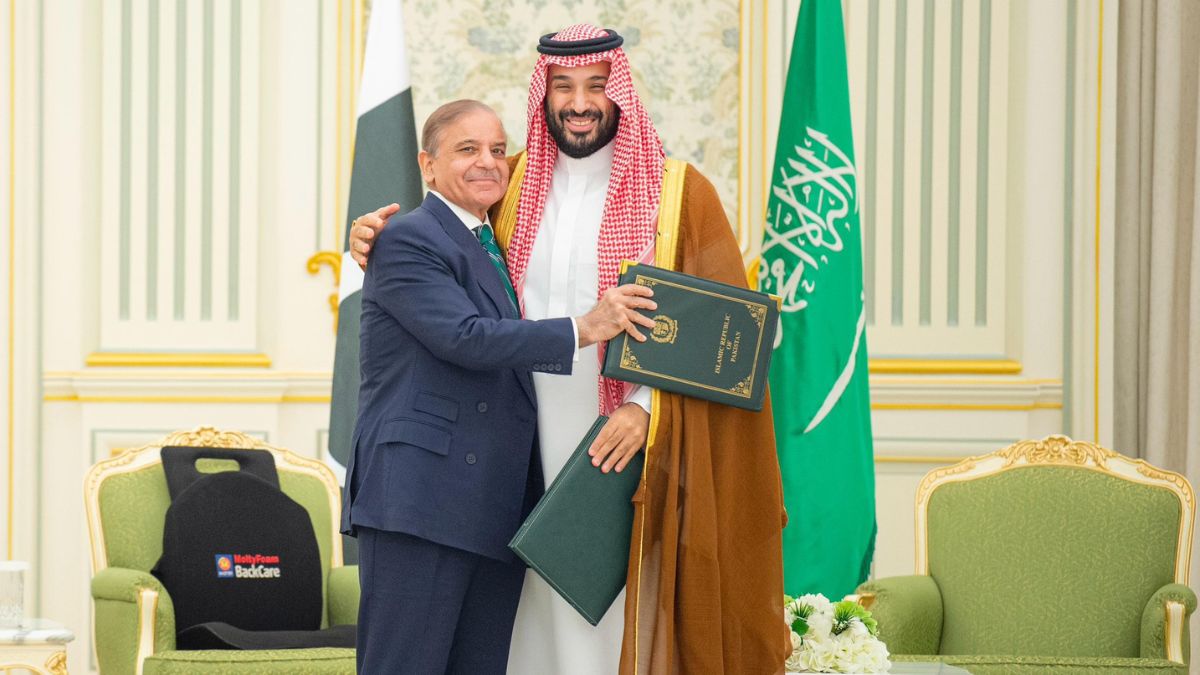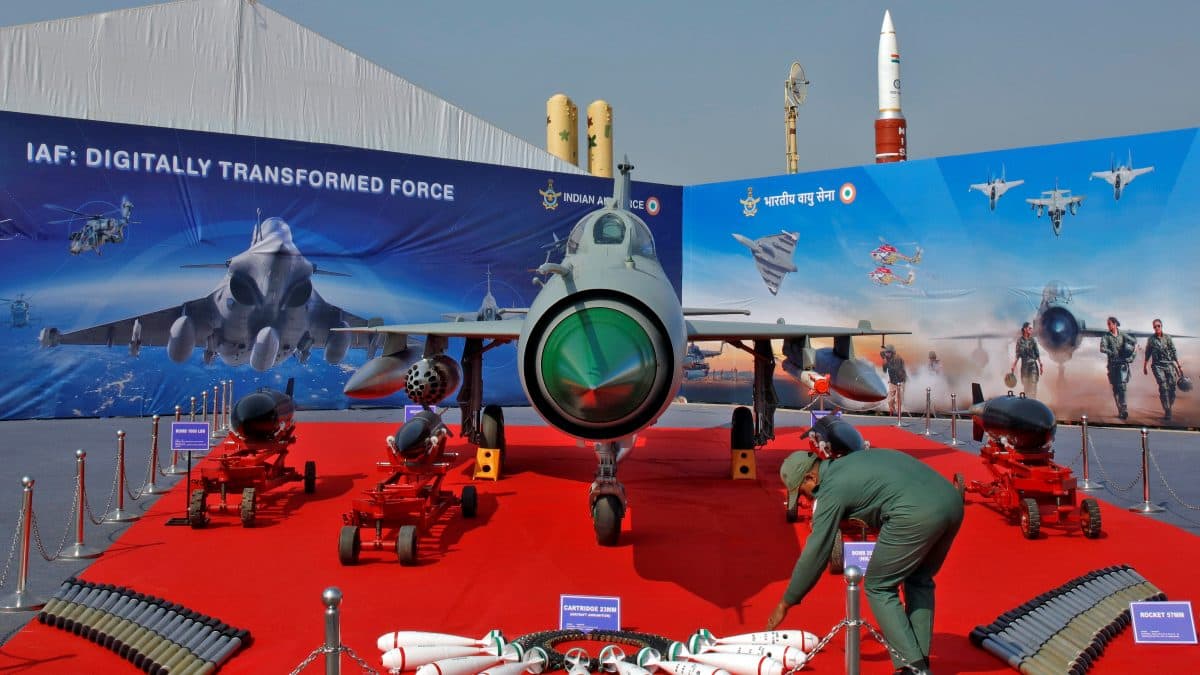On September 17, Pakistani Prime Minister Shehbaz Sharif signed the Strategic Mutual Defence Agreement with Saudi Crown Prince Mohammed bin Salman. The ceremony at the Royal Court in al-Yamamah Palace in Riyadh was witnessed by senior officials from Saudi Arabia, alongside representatives from Pakistan, which included the Army Chief Field Marshal Asim Munir.
To quote the joint statement, “This agreement, which reflects the shared commitment of both nations to enhance their security and to achieve security and peace in the region and the world, aims to develop aspects of defence cooperation between the two countries and strengthen joint deterrence against any aggression.”
The deal comes at a critical moment. Regional politics have been upended by two years of Israeli aggression, including its war on Gaza and strikes on neighbouring states, capped by last week’s Israeli attack on Doha, Qatar’s capital, which borders Saudi Arabia. In the Indian context it was signed soon after Operation Sindoor.
Describing the deal as the culmination of “years of discussions”, a senior Saudi official said that “this is not a response to specific countries or specific events but an institutionalisation of longstanding and deep cooperation between our two countries”. “This is a comprehensive defensive agreement that encompasses all military means,” while declining to specify if it includes Pakistan’s nuclear arsenal.
History of Pakistan: Saudi Military Relations
The agreement builds on nearly eight decades of close partnership between the two nations, rooted in shared Islamic heritage and long-standing defence cooperation.
Impact Shorts
More ShortsSaudi Arabia was one of the first countries to recognise Pakistan after its independence. In 1951, the two nations signed a “Treaty of Friendship”, laying the foundation for decades of strategic, political, military, and economic cooperation. Pakistani troops went to Saudi Arabia in the late 1960s amid concerns about Egypt’s war in Yemen at the time. The military cooperation deepened after the 1979 Grand Mosque seizure in Mecca, when Pakistan’s Special Forces helped Saudi troops.
In 1982, the two sides institutionalised security ties through a Bilateral Security Cooperation Agreement, which further cemented this cooperation by ensuring the “deputation of Pakistan Armed Forces personnel and military training” in Saudi Arabia. According to reports, over 8,000 Saudis have been trained by Pakistan since 1967.
Brigadier Feroz Hassan Khan, in his book Eating Grass: The Making of the Pakistani Bomb, said Saudi Arabia provided “generous financial support to Pakistan that enabled the nuclear programme to continue, especially when the country was under sanctions".
But the pact comes at a time when the Middle East’s geopolitical chessboard is in flux. Saudi Arabia has two primary adversaries, Iran and Israel, and relies on the US for its security needs. However, the fallout from Israel’s war on Gaza and its strikes on regional neighbours has made Gulf states uneasy, as America remains Israel’s closest ally.
Incidentally, Qatar, which was attacked by Israel on September 9 for hosting Hamas leaders, serves as the forward headquarters for US Central Command.
Apparently, approximately 40,000–50,000 US troops are stationed across the Middle East, deployed in large bases and smaller forward sites, including Prince Sultan Air Base outside Riyadh.
While the deal is being viewed as a landmark moment in the decades-old alliance between the two nations whose ties stretch back nearly eight decades. But Zalmay Khalilzad, a former US diplomat with long experience in Afghanistan and Pakistan, expressed concern over the deal, saying it comes in “dangerous times”.
“Pakistan has nuclear weapons and delivery systems that can hit targets across the Middle East, including Israel. It also is developing systems that can reach targets in the US," Khalilzad wrote on X.
The Agreement Strengthens Relations
Pakistan’s Ministry of Foreign Affairs said the agreement with Saudi Arabia reflects the “shared commitment” of both nations to strengthen security and promote regional peace, while also pledging to “strengthen joint deterrence against any aggression”. However, the clause to strengthen defence cooperation and joint deterrence across various military and defensive means is important.
“The agreement states that any aggression against either country shall be considered an aggression against both.” This Nato-style wording will be viewed in Islamabad as a major diplomatic victory.
In his 2024 book War, American journalist Bob Woodward recounted a conversation in which Saudi Crown Prince MBS reportedly told US Senator Lindsey Graham that Riyadh planned to enrich uranium only for energy purposes.
When Graham expressed concern about the prospect of a Saudi bomb, Woodward wrote, “Salman replied, ‘I don’t need uranium to make a bomb. I will just buy one from Pakistan.’”
However, the clarity about the ambit of the agreement signed between Pakistan and Saudi Arabia with regard to nuclear weapons remains unclear.
Husain Haqqani, former Pakistan Ambassador to the US, posted on X, “Most likely, Pakistan will now be able to buy US weapons it needs with Saudi money, which the Trump administration seems willing to sell.”
Implications for India
While the deal appears to be aimed at Israel, Yemen and Iran, it has implications and consequences for India. The present state of India-Pakistan relations necessitates that Pakistan entering into a formal defence pact with another country could affect India’s security, diplomatic, and foreign policy calculus, and external backing could also lower Pakistan’s threshold for confrontation.
The agreement could rebalance the Pakistan-Saudi relationship, which in recent years has been defined by Saudi financial bailouts for a struggling Pakistani economy, even as Saudi Arabia and India have got closer in recent years. The question remains as to whether Saudi Arabia has committed itself to Pakistan’s disputes with India and potentially with the Taliban-led Afghanistan.
No wonder, the MEA spokesperson Randhir Jaiswal said, “We will study the implications of this development for our national security as well as for regional and global stability. The government remains committed to protecting India’s national interests and ensuring comprehensive national security in all domains.
While there are many unanswered questions regarding the pact, specifically regarding what it does or does not cover, including deterrence, resource commitment, and operational details, that does not diminish the significance of this pact.
The India-Middle East-Europe Economic Corridor (IMEC), which passes through Saudi Arabia, could also now face headwinds, as the defence pact with Pakistan complicates India’s efforts to deepen strategic and economic ties with the kingdom.
But it seems that the pact is likely to have a limited role for India, as India is a close business partner of Saudi Arabia, which has invested billions of dollars and plans to invest more than $100 billion in five years. In fact, Saudi Arabia is India’s fourth-largest trading partner, while India ranks as Riyadh’s second-largest partner. The annual trade in 2024–25 reached $42.98 billion, whereas trade between Saudi Arabia and Pakistan is much smaller, at about $3-4 billion. India is also one of the biggest importers of Saudi oil. This makes it unlikely that Riyadh would take steps that might not be in India’s interests.
A senior Saudi official, who spoke on condition of anonymity, said, “Our relationship with India is more robust than it has ever been. We will continue to grow this relationship and seek to contribute to regional peace whichever way we can.”
Conclusion
In the Cold War era, Pakistan signed a Mutual Defence Assistance Agreement with Washington in 1954 and became a member of the Southeast Asia Treaty Organisation (SEATO) the same year. The following year, Pakistan joined Iran, Turkey and others in the Baghdad Pact, or the Central Treaty Organisation (CENTO).However, these 1950s alliances did not lead to automatic US military intervention on Pakistan’s behalf during its conflicts with India in 1965 and 1971—though being an American ally emboldened Pakistan in 1965, and in 1971, US support was indeed overt. This highlights the fact that defence agreements often come with caveats and context.
Even with China, despite extensive defence cooperation, Pakistan lacks a formal mutual defence pact. But for Saudi Arabia it is a signal that it is willing to diversify alliances beyond traditional Western security guarantees and an acknowledgement of waning American influence.
In the immediate term, this agreement will consolidate and formalise multi-pronged defence cooperation already under way and open new avenues to expand it via joint training, defence production and potential expansion of the Pakistani troop contingent in Saudi Arabia. The political and defence coordination between the two sides will deepen, while strengthening the respective military capabilities of both countries.
For Saudi Arabia, it strengthens defence against threats from Iran, Yemen’s Houthi militias, and the regional turbulence caused by Israel. However, Pakistan now risks entanglement in Saudi Arabia’s regional rivalries, particularly with Iran.
By declaring that an attack on one will be treated as an attack on both, the pact aims to deter potential aggressors and raise the cost of hostile actions against either country.
For India, the agreement has strategic implications which are concerning. Pakistan is India’s main security rival, armed with nuclear weapons. Hence, this pact with Saudi Arabia gives Pakistan political backing and financial cover that could embolden it to escalate tensions.
The author is a retired Major General of the Indian Army. Views expressed in the above piece are personal and solely those of the author. They do not necessarily reflect Firstpost’s views.


)

)
)
)
)
)
)
)
)



